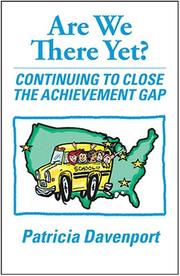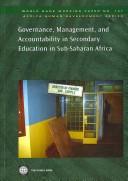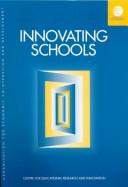| Listing 1 - 10 of 182 | << page >> |
Sort by
|
Book
Year: 2013 Publisher: Washington D.C. : The World Bank,
Abstract | Keywords | Export | Availability | Bookmark
 Loading...
Loading...Choose an application
- Reference Manager
- EndNote
- RefWorks (Direct export to RefWorks)
The Uganda school system has expanded over the years resulting from mass education reforms at the primary ? since 1997, and the lower secondary level ? since 2007. This has enabled provision of key inputs to schools by Government which include tuition, trained teachers, school infrastructure, and learning materials. The curriculum for the primary level was also reviewed. However, completion rates and learning outcomes are still low which points to inefficiency and low quality of education provided. Current discourse on education is focused on the need to improve efficiency and quality of education. This study is therefore, an attempt to provide a comprehensive analysis of learning outcomes and teacher effectiveness, drawing from the nationally owned and multi-year assessment data sets for Uganda between 2006-2011. This book provides some answers to questions like: What are the performance levels of learners over the years? What are the curriculum areas that learners find most difficult as measured by their performance and have these been the same over the years? What determines learners? performance? What is the content knowledge level of the teachers? What are the teacher characteristics that determine learners? performance? How effective are the teachers? Guidance on next steps is also provided. The main contribution of this book is three fold: (a) It explores learners? performance by curriculum area; (b) It links learners? performance with teachers? competency levels by curriculum content area, making it one of the very few materials available in the Africa region. It therefore, amplifies the importance of focusing on what learners find a problem in the teaching-learning process in the quest for quality. The findings also reveal that teacher effectiveness is very low and efforts to improve instructional methods have to be prioritized by Government; and (c), it provides insights on the various dimensions to the education quality and efficiency challenge that many developing countries are grappling with today, and the depth of analysis that have to be undertaken.

ISBN: 9781601970015 1601970013 Year: 2006 Publisher: APQC
Abstract | Keywords | Export | Availability | Bookmark
 Loading...
Loading...Choose an application
- Reference Manager
- EndNote
- RefWorks (Direct export to RefWorks)
Book
ISBN: 1953079598 9781953079596 9780873899376 0873899377 Year: 2017 Publisher: Milwaukee, Wisconsin
Abstract | Keywords | Export | Availability | Bookmark
 Loading...
Loading...Choose an application
- Reference Manager
- EndNote
- RefWorks (Direct export to RefWorks)
Kaizen Kanban is a guide to creating prioritized project pipelines and setting up improvement boards to maximize business success through the execution of continuous improvement projects.
Continuous improvement process. --- Project management --- Quality control.

ISBN: 0815728352 Year: 2000 Publisher: Washington Brookings Institution
Abstract | Keywords | Export | Availability | Bookmark
 Loading...
Loading...Choose an application
- Reference Manager
- EndNote
- RefWorks (Direct export to RefWorks)
Education and state --- Education --- School improvement programs --- Social aspects

ISBN: 128119140X 9786611191405 0821373471 0821373463 Year: 2006 Publisher: Washington, D.C. : Human Development Dept., Africa Region (AFTHD), World Bank,
Abstract | Keywords | Export | Availability | Bookmark
 Loading...
Loading...Choose an application
- Reference Manager
- EndNote
- RefWorks (Direct export to RefWorks)
Increasingly the role of management and governance is recognized as important for providing and delivering effective services at all levels of education. In view of the growing demand for more and better services at secondary education levels, these are crucial issues that must be addressed urgently. Sub-Saharan Africa's secondary education and training systems must become more efficient and more effective. The current (unit) costs of junior and senior secondary education in most African countries prevent massive expansion of post-primary education. This demands a holistic approach to governan
High schools --- Education, Secondary --- School improvement programs --- Educational accountability --- Administration. --- Improvement programs, School --- Instructional improvement programs --- Programs, School improvement --- School self-improvement programs --- Accountability in education --- Children --- High school education --- High school students --- Secondary education --- Secondary schools --- Education (Secondary) --- Education --- School management and organization --- Responsibility --- Educational indicators --- Educational productivity --- Schools --- Teenagers
Book
ISBN: 128301632X 9786613016324 0821386808 0821386794 Year: 2011 Publisher: Washington D.C. : World Bank,
Abstract | Keywords | Export | Availability | Bookmark
 Loading...
Loading...Choose an application
- Reference Manager
- EndNote
- RefWorks (Direct export to RefWorks)
This book is about the threats to education quality in the developing world that cannot be explained by lack of resources. It reviews the observed phenomenon of service delivery failures in public education: cases where programs and policies increase the inputs to education but do not produce effective services where it counts - in schools and classrooms. It documents what we know about the extent and costs of such failures across low and middle-income countries. And it further develops the conceptual model posited in the World Development Report 2004: that a root cause of low-quality and ineq
Educational tests and measurements --- Educational accountability --- Public schools --- School improvement programs. --- Educational leadership. --- Examinations. --- College leadership --- Education leadership --- School leadership --- Improvement programs, School --- Instructional improvement programs --- Programs, School improvement --- School self-improvement programs --- Common schools --- Grammar schools --- School funds --- Secondary schools --- Leadership --- School management and organization --- Schools
Book
ISBN: 0821398474 0821398490 Year: 2013 Publisher: Washington D.C. : World Bank,
Abstract | Keywords | Export | Availability | Bookmark
 Loading...
Loading...Choose an application
- Reference Manager
- EndNote
- RefWorks (Direct export to RefWorks)
Expansion of school systems through the ongoing mass education reforms in most developing countries not only translate into increased school enrolments but also increased human and financial resources at the school level. How these resources are managed is therefore central to the quest for quality and efficiency. This book therefore, is an attempt to provide insights on how schools are managed in Uganda in terms of policy and practice. The book clearly shows that Uganda's primary education reform program is anchored on clear legislated policy framework supported by intensive provision of key
School improvement programs --- School children --- Curriculum planning --- Teacher effectiveness --- School-based management --- Food --- Site-based management (School management) --- School management and organization --- Teacher quality --- Teachers --- Effective teaching --- Curriculum development --- Education --- Instructional systems --- Planning --- Elementary school students --- Primary school students --- Pupils --- Schoolchildren --- Children --- Students --- Improvement programs, School --- Instructional improvement programs --- Programs, School improvement --- School self-improvement programs --- Curricula --- Design
Book
ISBN: 0821398504 0821398601 Year: 2013 Publisher: Washington, D.C. : World Bank,
Abstract | Keywords | Export | Availability | Bookmark
 Loading...
Loading...Choose an application
- Reference Manager
- EndNote
- RefWorks (Direct export to RefWorks)
The Uganda school system has expanded over the years resulting from mass education reforms at the primary - since 1997, and the lower secondary level - since 2007. This has enabled provision of key inputs to schools by Government which include tuition, trained teachers, school infrastructure, and learning materials. The curriculum for the primary level was also reviewed. However, completion rates and learning outcomes are still low which points to inefficiency and low quality of education provided. Current discourse on education is focused on the need to improve efficiency and quality of educa
Curriculum planning --- School improvement programs --- Teacher effectiveness --- School-based management --- Site-based management (School management) --- School management and organization --- Teacher quality --- Teachers --- Effective teaching --- Improvement programs, School --- Instructional improvement programs --- Programs, School improvement --- School self-improvement programs --- Curriculum development --- Education --- Instructional systems --- Planning --- Curricula --- Design
Book
ISBN: 0821362151 082136216X 9780821362150 9786610199204 1280199202 Year: 2005 Publisher: Washington, D.C. : World Bank,
Abstract | Keywords | Export | Availability | Bookmark
 Loading...
Loading...Choose an application
- Reference Manager
- EndNote
- RefWorks (Direct export to RefWorks)
Latin America faces tremendous challenges, particularly those of development, poverty, and inequality. Education is widely recognized as one of the most critical means of defeating these challenges. Democratizing education, by improving both its coverage and quality, is critical to overcoming the social and economic inequality that plagues Latin America. Ensuring that all children have the opportunity to learn critical skills at both primary and secondary level is paramount to overcoming skill barriers that perpetuate underdevelopment and poverty. A growing body of evidence supports the intuit
Teacher education. Teacher's profession --- School management --- Latin America --- Teachers --- Rewards and punishments in education --- School improvement programs --- Salaries, etc. --- School management and organization --- Improvement programs, School --- Instructional improvement programs --- Programs, School improvement --- School self-improvement programs --- Educational psychology --- Incentive (Psychology) --- Punishment (Psychology) --- School discipline --- Incentives in education --- School employees --- Faculty (Education) --- Instructors --- School teachers --- Schoolteachers

ISBN: 1280081368 9786610081363 9264181423 9264170219 Year: 1999 Publisher: Paris OECD
Abstract | Keywords | Export | Availability | Bookmark
 Loading...
Loading...Choose an application
- Reference Manager
- EndNote
- RefWorks (Direct export to RefWorks)
It is now widely agreed that learning is pivotal in the "knowledge societies" of today and, still more, of tomorrow. It is also widely agreed that schools have a key role to play in laying the foundations for lifelong learning for all of us. But, how well are these aims being met? How innovative are schools as institutions? And what are some of the most promising examples across OECD countries from which we can learn? This volume addresses these questions, drawing on a major OECD/Japan conference which was held in Hiroshima and attended by experts from 24 countries and a "virtual" conference conducted in parallel. It presents key trends and policy challenges regarding schools for today and tomorrow, from European traditions across to the different perspectives of the Asia-Pacific region, with a particular focus on Japan. Alongside expert chapters are the innovative schools themselves, with examples taken and synthesised from many of the countries that attended the Hiroshima conference. The volume addresses issues of curriculum, innovation and the achievement of lifelong learning in the schools of tomorrow.
School improvement programs. --- Educational innovations. --- Educational change. --- School improvement programs --- Educational change --- Education --- Social Sciences --- Theory & Practice of Education --- Change, Educational --- Education change --- Education reform --- Educational reform --- Reform, Education --- School reform --- Improvement programs, School --- Instructional improvement programs --- Programs, School improvement --- School self-improvement programs --- Innovations, Educational --- Technological change in education --- Innovations --- Technological innovations --- Educational planning --- Educational innovations --- School management and organization --- Educational technology --- Experimental methods
| Listing 1 - 10 of 182 | << page >> |
Sort by
|

 Search
Search Feedback
Feedback About UniCat
About UniCat  Help
Help News
News